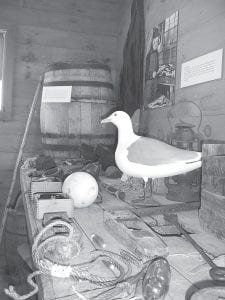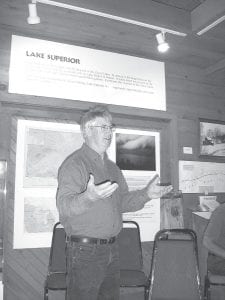Staff photos/Brian Larsen Above: An old worktable at the North Shore Commercial Fishing Museum in Tofte. Pictures and anecdotes from the lives of many North Shore settler families can be viewed at the museum, which hosted a fishcake dinner followed by the sharing of old fishing stories Friday, September 23, 2009. Left: Beaver Bay fisherman Clint Maxwell had a spellbinding tale to tell. He comes from a line of North Shore fishermen, and he was luckier than some of his relatives despite a harrowing adventure back in December 1976.

On December 10, 1976, young Beaver Bay fisherman Clint Maxwell did not know the wind would be switching that day. It would have been better for him if he had known, but then again, maybe it was better in the end that he didn’t.
After a fisherman’s dinner of fishcakes, boiled vegetables, bread, and butter at the Tofte Fishing Museum Saturday, September 26, 2009, guests settled in under one of the building’s twin eaves to listen to old fishing stories.
After Roberta Sve of Little Marais reminisced about the Scandinavian brogue she grew up hearing all around her, Maxwell got up to tell his tale. His story was about the time he drifted across Lake Superior in his fishing boat, ending up being rescued at Devil’s Island, one of the outermost Apostle Islands. Maxwell started out his tale by pointing to a map of Lake Superior and its surrounding shoreline. He had some trouble finding Devil’s Island, however. “No wonder I was lost!” he said.
Maxwell had listened to “Heat Wave” Burler, the Duluth TV meteorologist, giving his weather prediction the night before, but he doesn’t remember Heat Wave predicting that the wind would switch from the southwest to the northwest.
Everything started out fine, or so Maxwell though, until his motor quit working. Young and foolhardy, he had brought no tools with him. He started to row, but the wind was wrong, and then his oarlock broke. He started to drift and knew he was in trouble.
Maxwell started to notice that the sky, the water, and the boat — everything within his line of vision — had no color. Everything was gray. “I kind of knew what hell was,” he said. “I probably was gray, too.”
Maxwell started to think about his uncles. His uncle Kermit had told him that he was part of a chain of fishing uncles and nephews. Great Uncle Martin had passed the tradition on down to Uncle Kermit before going down in a ship in Lake Erie. Uncle Kermit passed the tradition down to Maxwell and then drowned on September 17, 1975 at the age of 58 in a boat that was too small and in an area of Lake Superior he was unfamiliar with. Thesummer before, Uncle Kermit had told Maxwell to do something that seemed odd. Go put my aluminum boat in the woodshed, Uncle Kermit had said. It was the boat he ended up using in place of his fishing boat, made of steel, that needed repair the day he died.
The Edmund Fitzgerald had gone down the year before as well. Gordon Lightfoot’s song, The Wreck of the Edmund
Fitzgerald,
was out, and it rang through Maxwell’s head over and over as he drifted. “I had all the time in the world to think,” he said.
Maxwell’s only hope was that he had no nephews, so he hadn’t been able to pass the tradition on down to the next generation. “Thetrick is not to have anybody who follows you yet,” he said.
As he drifted and thought and worried, Maxwell made a vow to God that he would do something for God if he survived.
Eventually, as Maxwell sang The Wreck of the Edmund
Fitzgerald,
he spotted a light in the distance. It was the lighthouse on Devil’s Island. The island is aptly named, Maxwell said, because it was edged with cliffs and surrounded by ice. He slid his boat up onto the ice underneath the cliffs.
On his way to shore, Maxwell wondered how he was going to keep from getting hypothermia.
Fortunately, he had a big warm jacket, and he put a galvanized steel bucket on his head as he sloshed his way to land.
He didn’t know it at the time, but Heat Wave Burler was predicting that the wind would take him to the area around Devil’s Island, although the Coast Guard was looking for him somewhere else. Another thing he didn’t know at the time was that his cousin called a friend and asked him to go up in his plane and look for him there, which he did. He spotted Maxwell and notified the Coast Guard.
Thefirst thing that happened was that a jet flew over and dropped a note with the piece he needed to fixhis boat. Thenote told him to raise his hands if he was Clint Maxwell.
“I was given a gift. I was saved,” he said.
When the Coast Guard got to him, he was chagrined to hear someone say, “Maxwell – isn’t that the guy we rescued in September?” It was true. The Coast Guard had rescued him just three months before.
Things went well for Maxwell after that. For a while, anyway. He made a lot of money. But then things stopped going well. He lost a lot of money.
He remembered his vow.
He figured that things had gone south because he had forgotten his vow to God. His life changed after that. He fulfilled his vow, or he is trying to fulfill his vow, day by day. “God has priority now,” he said.
He was saved in more than one way that stormy day in December 1976.
Maxwell still fishes today, along with working for at the taconite plant nearby. In his boat, he carries a gaff hook and 1,200 feet of rope to keep him from drifting away again.
“All the old-timers helped me out at one time or another,” Maxwell said. They sold him nets, gave him things, offered him advice. Everyone called veteran fisherman Hjelmer Aakvik (who almost died trying to save another fisherman) “the Captain,” Maxwell recalled. He enjoyed Bud Sivertson’s stories of the Isle Royale moose that chewed tobacco.
Maxwell believes Lake Superior is healthy. It holds 3,000 cubic miles of water, and Maxwell believes it’s clean enough to drink. He brought out a laugh from the audience when he compared it to bottled water from France “where all the nuclear reactors are.
“…I would say the fish are very healthy, very abundant,” he said. “Our fishing has no correlation with the amount of fish that are out there,” he said. He manages his catches – it doesn’t do any good for him to get more than a couple hundred pounds of herring because it must be sold fresh. Maxwell is starting to see all varieties of lake trout coming back as well.
Maxwell was “green” before anyone considered the word anything but the color of leaves. When he was young, he was determined to avoid hurting the environment. At the time, he said, the herring had been pushed way offshore when taconite tailings were being dumped into the lake. The lake was cleaned up, but as the shoreline water became clearer, the smelt disappeared. The water is really clear now, Maxwell said. He can see “really deep.”
Dealing with seagulls (technically “herring gulls”) is an ongoing challenge. He recently found two gulls flapping around his fish house with no idea how to get out. He is happy with an eagle and a fox that stick around helping keep the seagulls in check. Recently, a gull took a fish out of his hand as he was reaching with his other hand for something inside his boat. “Disgusting!” he exclaimed. “No respect!”
Brian Tofte told some stories of his own about the days when locals protected the Nimmity Brothers from the game warden who caught them with illegal beaver, when Alfred Fenstad formed a fish company and, later, extended phone service along the shore, and when the town of Cramer had 2,000 people living in it.
Tofte talked about a nephew staying at his house who told him that some guy had entered their house early in the morning, stepped over him, walked to the refrigerator and then left. That would have been Maxwell, delivering Tofte’s standing order for fresh fish and finding the $20 Tofte keeps on top of the fridge for him.
“We have so many more stories to tell,” Tofte said, “that can’t fit into this building.”



Loading Comments